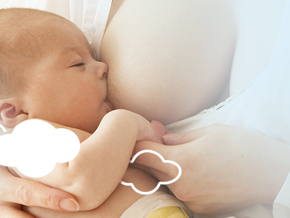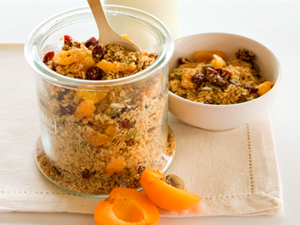
Am I ready for a Baby? 6 things to Consider
Thinking about having a baby, but unsure if you're ready? From budgeting to parenting support, if you’re someone who likes to plan, our baby-ready checklist may help.
Thinking about having a baby? While nothing can truly prepare you for parenthood, asking yourself, "Am I ready for a baby?" can help you anticipate some of the realities of being a parent and manage your expectations before committing to having a child. Our baby-ready checklist can help you identify your parenting support network, get budgeting tips to prepare for the cost of having a baby, and more.
1. Consider the factors at play
Deciding to start a family is a huge decision, and many factors can affect when and if you choose to have a baby. Think about finances, career goals, health implications, family structure, parental support, and even the environment. A good starting point is to consider how these factors might impact your unique situation and help you determine the best time to get pregnant.
2. Explore your motivations
It might seem obvious, but besides asking, "Am I ready for a baby?", also consider if this is the best time to get pregnant. Make sure your partner is on the same page. Understanding your motivations for wanting to have a baby can help you determine if you're emotionally ready for parenthood. If you're feeling pressured by family, friends, or society, or if you're hoping a baby will improve your relationship, it might be worth addressing these feelings first. Pay attention to how you feel when you think about having a baby or imagine being pregnant. These feelings can give you a good sense of how ready you really are.
3. Embrace the changes
Parenthood is an emotional rollercoaster—especially at the start—with plenty of highs and lows! It's good to have realistic expectations of what your days and nights will be like after giving birth. You may face many changes and challenges, such as body changes, feeding issues, disrupted sleep, changes in how you socialise, how and where you spend your time, and shifts in your working life. Some parents may also experience feelings of loneliness or guilt, pressure from others or themselves, and strain on relationships. While your unique experience will be impossible to predict in full, it can still be helpful to talk to friends and family members about their experiences (keeping in mind that everyone's reactions to parenthood are different) and to do your own research to help you anticipate what may lie ahead. Check out our checklist on new mum emotions to learn about some of the feelings you might go through as a new parent.
4. Plan for the financial side
Money is a big factor when thinking about having a baby—raising children can be expensive, and there can be a lot to take into account, from whether any paid parental leave will be enough to support you, to the potential costs of childcare and, of course, buying the things you need for a baby and beyond. Before trying to get pregnant, you might want to spend some time saving and budgeting for the cost of having a baby, so that when the time comes, the financial impact is easier to manage. Getting your accounts in order before starting a family can improve your financial resilience and help ease money worries once you become a parent—leaving you free to focus on parenting.
5. Build a parenting plan
Whether you’re in a stable relationship, planning to be a solo parent, or co-parenting, it's a great idea to spend some time thinking about how you will approach parenting. Consider who will be the primary caregiver (if there will be one), where the baby will live, who will take on which parenting duties and to what degree, and what the baby's routine might be. Check out our articles on mastering equal shared parenting and effective co-parenting for more ideas. You don’t have to have everything figured out—some things you won’t know until after the baby arrives. Remember, whatever parenting arrangement you settle on should be what's best for you and your family. It's good to keep an open mind and remain flexible as you figure out life as a parent and your baby's needs evolve. Having a loose framework can help you create the kind of routine that a baby thrives on and build confidence in your role.
6. Rally your support network
It's often said that it takes a village to raise a child. So, take a moment to think about who is in your support network. Can you count on a supportive partner or co-parent? Do you have family or close friends who are available and willing to support you and your child? Can you find a trusted form of paid childcare, such as a babysitter or daycare centre? Check out our article on how to choose between preschool or daycare for tips. And if you work, consider how supportive your employer is in terms of parental leave and returning to work, such as offering flexible working hours. Knowing who is on your team and what role they may take on in your new life as a parent can significantly boost your readiness for the journey into parenthood. Once you're ready to start trying, read our preconception checklist and take it with you to your healthcare professional checkup.
Frequently asked questions about whether you are ready for a baby
When is the right time to have a baby?
The best time to get pregnant varies for each individual and couple. Consider your emotional readiness, financial stability, and support systems. It's important to discuss your goals and values with your partner. Ultimately, the decision should align with your personal circumstances and aspirations for family life.
What age is your body most ready to have a baby?
Biologically, the best age to get pregnant for a woman is in her 20s to early 30s. During this period, fertility is typically at its peak, and the risks of complications during pregnancy are lower. However, individual health and circumstances vary, so it's essential to consider personal factors and consult with a fertility specialist if you have any questions about your best age to get pregnant.
How do you know you're financially ready for a baby?
Determining financial readiness for a baby involves evaluating several key factors. First, having a stable income that can support the additional expenses associated with a child will help. Creating a budget to account for prenatal care, delivery, and ongoing costs such as nappies, childcare, and medical expenses is key. You may also feel more comfortable having an emergency fund set aside for unexpected costs that may arise. Reviewing your health insurance is crucial to understand the maternity and paediatric care benefits available to you. Additionally, consider your existing debt and whether you can manage further financial responsibilities. Ultimately, a thorough financial plan and open communication with your partner are essential in making this important decision.
How do you know if you are ready to have a baby?
Determining if you are ready to have a baby involves assessing several personal and emotional factors. First, consider your emotional readiness and willingness to embrace the responsibilities of parenthood. Reflect on your relationship stability or whether you’re capable of going it alone. Evaluate your financial situation to ensure you can support a child, including budgeting for both immediate and ongoing expenses. Additionally, consider your physical health and any lifestyle changes that may be necessary. Finally, think about your support system, including family and friends, and whether you have resources available for guidance and assistance. Ultimately, readiness is a personal decision that requires thoughtful consideration of these aspects.






